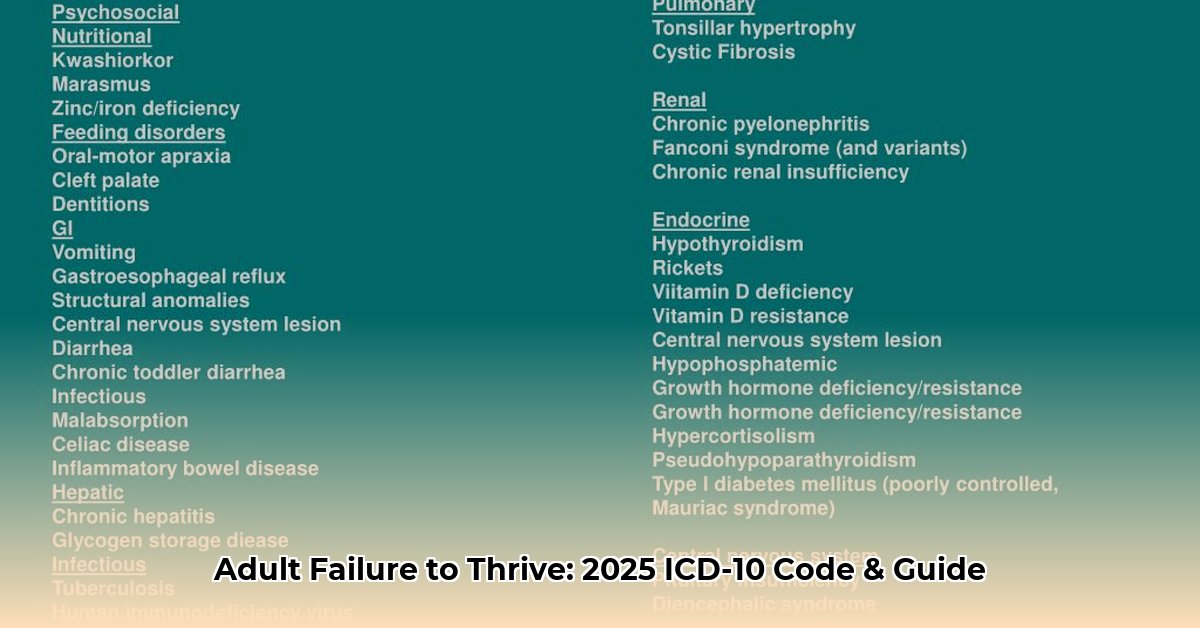This comprehensive guide provides healthcare professionals with detailed information regarding the ICD-10-CM code R62.7 for Adult Failure to Thrive (AFTT), reflecting the 2025 updates effective October 1, 2024.
R62.7: At-a-Glance
| Code | Description | Age Range | Billable | Effective Date |
|---|---|---|---|---|
| R62.7 | Adult Failure to Thrive | 15-124 years | Yes | 10/1/2024 |
Decoding Adult Failure to Thrive (R62.7)
AFTT represents a progressive decline in physical and/or cognitive function in adults, often accompanied by weight loss, diminished appetite, and reduced social engagement. This decline surpasses typical age-related changes and isn’t solely attributable to a specific underlying medical condition. R62.7 facilitates documentation and communication regarding this multifaceted syndrome.
Related and Distinct Diagnoses
While AFTT shares similarities with other conditions, crucial distinctions guide accurate coding:
- R62.51 (Childhood Failure to Thrive): Reserved for individuals under 15, distinguishing pediatric cases from AFTT.
- Specific Deficiencies/Diseases: R62.7 isn’t used when the decline stems from identifiable causes like nutritional deficiencies (e.g., E63.-) or wasting diseases with known etiologies (e.g., E88.A-). These “Excludes2” notations indicate the presence of more specific diagnoses.
Clinical Presentation and Diagnostic Process
Diagnosing AFTT involves a comprehensive evaluation encompassing various factors:
- Weight Loss: Unexplained and unintentional weight loss is a frequent indicator.
- Appetite Changes: Diminished appetite or disinterest in food can contribute to weight loss and overall decline.
- Reduced Physical Activity: Decreased mobility and energy levels may limit participation in activities.
- Cognitive Decline: Changes in memory, concentration, or overall cognitive function can be observed.
- Social Withdrawal: Reduced social interaction and isolation can exacerbate AFTT.
- Impaired Immune Function: Increased susceptibility to infections and illness may be present.
Diagnostic Steps
Clinicians typically employ a multi-faceted approach to diagnose AFTT:
- Comprehensive Medical History and Physical Examination: Identifying or ruling out underlying medical conditions.
- Nutritional Assessment: Evaluating dietary habits, weight trends, and biochemical markers for deficiencies.
- Functional Assessment: Measuring the ability to perform activities of daily living (ADLs).
- Cognitive Evaluation: Screening for cognitive impairment using tools like the Mini-Mental State Examination.
- Psychological Assessment: Assessing for mood disorders like depression, which can mimic or coexist with AFTT.
Coding Accuracy and Best Practices
Proper application of R62.7 is crucial for accurate documentation, reimbursement, and research:
- Specificity: Use R62.7 when it accurately reflects the patient’s condition after excluding other specific diagnoses.
- Thorough Documentation: Clearly document all clinical findings supporting the AFTT diagnosis.
- Avoid Fragmentation: Don’t code individual symptoms separately if they’re integral to the AFTT syndrome.
2025 ICD-10-CM Update and Beyond
This guide reflects the 2025 ICD-10-CM update effective October 1, 2024. Staying current with annual updates from the Centers for Medicare & Medicaid Services (CMS) and the World Health Organization (WHO) is essential.
Disclaimer
This guide provides general information and does not constitute medical advice. Consult with a qualified healthcare professional for diagnostic and treatment decisions. Adherence to official coding guidelines is paramount for accurate billing and reporting. While this information aligns with current understanding based on the 2025 guidelines, ongoing research may further refine our understanding of AFTT.
- Choosing Glass Containers With Snap Lids for Fresh Food Storage - January 25, 2026
- Borosilicate Containers Keep Food Fresh and Your Kitchen Organized - January 24, 2026
- Borosilicate Glass Storage Containers Handle Extreme Temperatures Safely - January 23, 2026










